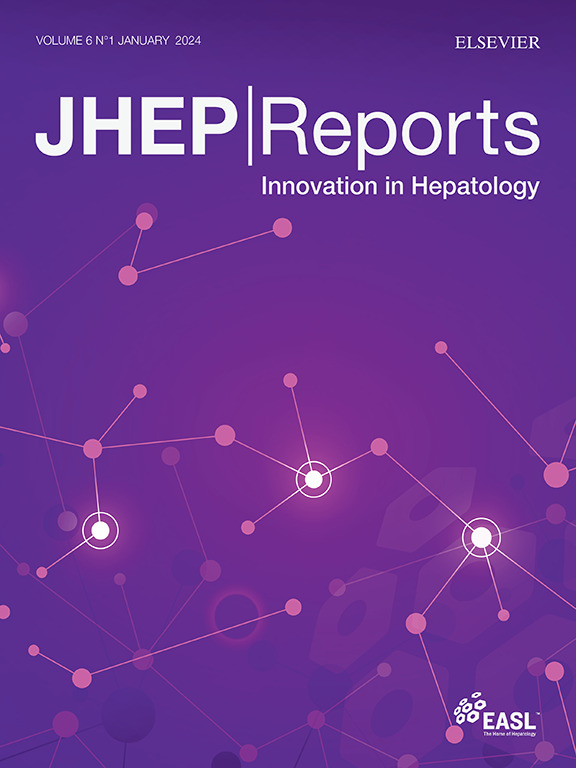抗干扰素的自身抗体在慢性乙型肝炎病毒感染者中很常见,并与PegIFNα无反应相关
IF 9.5
1区 医学
Q1 GASTROENTEROLOGY & HEPATOLOGY
引用次数: 0
摘要
背景,1型干扰素(T1)和3型干扰素(T3IFNs)与慢性乙型肝炎(CHB)的免疫发病机制有关。干扰素仍然是唯一获得许可的慢性乙型肝炎免疫调节疗法。我们测量了针对T1和t3ifn的自身抗体(auto-Abs)的患病率,以检验它们影响HBV控制和治疗反应的假设,正如COVID-19所强调的那样。方法采用多中心回顾性纵向研究,纳入2个慢性乙型肝炎队列;检测抗T1IFN和T3IFN的auto-Ab水平和中和状态。对HBV临床参数进行相关性检测。结果总体而言,16.7%(46/276)的CHB患者在任何时间检测到抗ifn自身抗体,6.5%(18/276)的CHB患者检测到抗t3ifn自身抗体,其中pegifn α-诱导的新生自身抗体发生率较高(31.4%,11/35)。然而,只有少数auto- ab阳性血清在体外表现出中和(4/ 46,8.7%)。Auto-Ab阳性与中位HBsAg水平升高相关(p = 0.0110)。所有检测到抗t1ifn自身抗体的个体均为PegIFNα无应答者。结论非中和性抗干扰素抗体在慢性乙型肝炎中常见,且与较高的中位HBsAg水平相关。需要进一步前瞻性研究抗细胞因子自身抗体在慢性乙型肝炎中的作用,以确定其与长期预后的关系。影响和意义shbv和PegIFNα各自可诱导与失调的抗病毒免疫反应相关的广泛自身反应性。PegIFNα治疗或其他免疫疗法前的Auto-Ab筛查可能在预测治疗反应中发挥关键作用。本文章由计算机程序翻译,如有差异,请以英文原文为准。

Auto-antibodies against interferons are common in people living with chronic hepatitis B virus infection and associate with PegIFNα non-response
Background & Aims
Type one (T1) and three interferons (T3IFNs) are implicated in chronic hepatitis B (CHB) immunopathogenesis. IFN remains the only licenced immune modulating therapy for CHB. We measured the prevalence of auto-antibodies (auto-Abs) against T1 and T3IFNs to examine the hypothesis that they impact HBV control and treatment response, as highlighted by COVID-19.
Methods
Our multi-centre retrospective longitudinal study accessed two CHB cohorts; auto-Ab levels and neutralisation status were measured against T1IFN and T3IFN. Associations were tested against HBV clinical parameters.
Results
Overall, 16.7% (46/276) of patients with CHB had any detectable anti-IFN auto-Abs at any time and 6.5% (18/276) anti-T3IFN auto-Abs, with a high incidence of PegIFNα-induced de novo auto-Abs (31.4%, 11/35). However, only a minority of auto-Ab-positive sera demonstrated neutralisation in vitro (4/46, 8.7%). Auto-Ab positivity correlated with higher median HBsAg levels (p = 0.0110). All individuals with detectable anti-T1IFN auto-Abs were PegIFNα non-responders.
Conclusions
Non-neutralising anti-IFN auto-Abs are common in CHB and associate with higher median HBsAg levels. Further prospective study of anti-cytokine auto-Abs in CHB are required to characterise the association with long-term outcomes.
Impact and implications
HBV and PegIFNα individually may induce broad autoreactivity associated with dysregulated antiviral immune responses. Auto-Ab screening prior to PegIFNα treatment or other immunotherapies may play a critical role in predicting treatment responses.
求助全文
通过发布文献求助,成功后即可免费获取论文全文。
去求助
来源期刊

JHEP Reports
GASTROENTEROLOGY & HEPATOLOGY-
CiteScore
12.40
自引率
2.40%
发文量
161
审稿时长
36 days
期刊介绍:
JHEP Reports is an open access journal that is affiliated with the European Association for the Study of the Liver (EASL). It serves as a companion journal to the highly respected Journal of Hepatology.
The primary objective of JHEP Reports is to publish original papers and reviews that contribute to the advancement of knowledge in the field of liver diseases. The journal covers a wide range of topics, including basic, translational, and clinical research. It also focuses on global issues in hepatology, with particular emphasis on areas such as clinical trials, novel diagnostics, precision medicine and therapeutics, cancer research, cellular and molecular studies, artificial intelligence, microbiome research, epidemiology, and cutting-edge technologies.
In summary, JHEP Reports is dedicated to promoting scientific discoveries and innovations in liver diseases through the publication of high-quality research papers and reviews covering various aspects of hepatology.
 求助内容:
求助内容: 应助结果提醒方式:
应助结果提醒方式:


